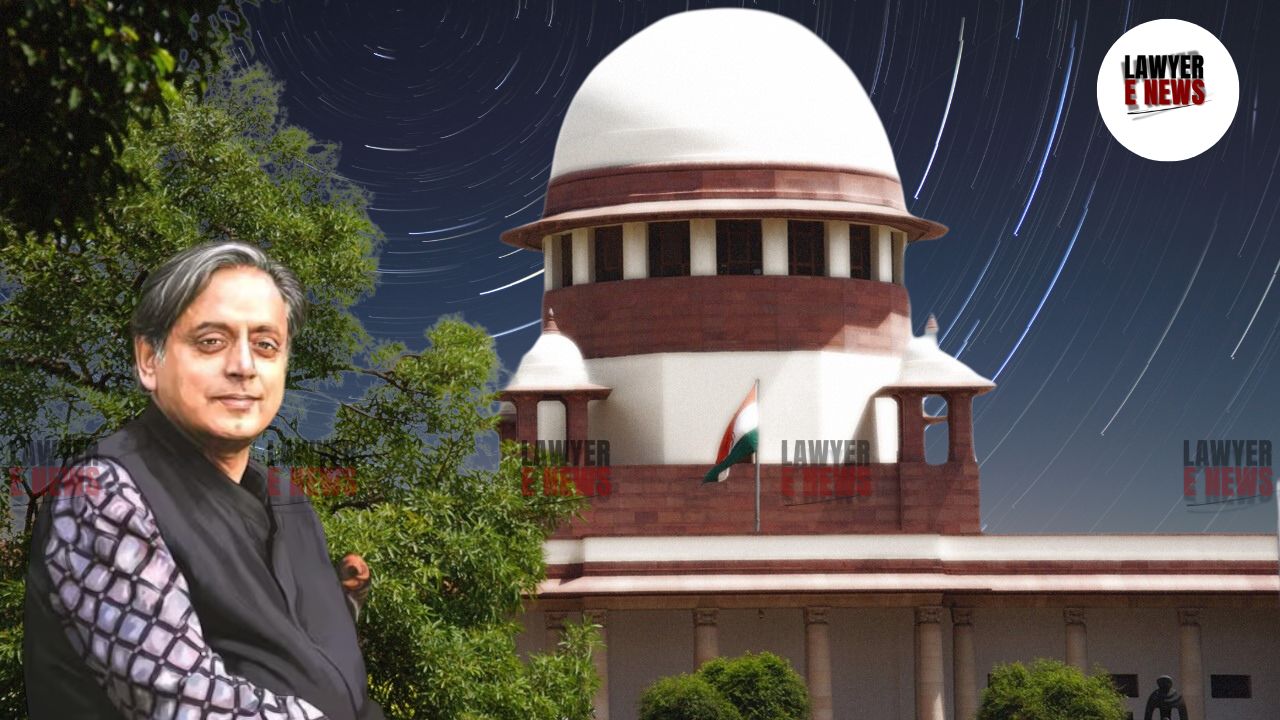-
by Admin
15 February 2026 5:35 AM



Supreme Court of India, in Shashi Tharoor v. State of NCT of Delhi & Anr., stayed the ongoing defamation proceedings against the petitioner, Member of Parliament Shashi Tharoor. The defamation complaint, based on comments made by Tharoor in 2018 referring to an earlier statement published in The Caravan magazine in 2012, was challenged by Tharoor on the grounds that the complainant did not qualify as an "aggrieved person" under Section 199 of the Code of Criminal Procedure (CrPC). The Court, after hearing initial arguments, issued a notice and stayed the proceedings.
The dispute arises from remarks made by Tharoor during a public speech on October 28, 2018, where he referenced a metaphor likening Prime Minister Narendra Modi to a "scorpion sitting on a Shivling," originally published in The Caravan magazine in 2012. The complainant, respondent No. 2, argued that the comments were defamatory due to the growing prominence of the Prime Minister and the Bharatiya Janata Party (BJP). While the article was not controversial at the time of its publication, the complainant alleged that Tharoor’s 2018 comments deliberately revived the metaphor to malign the Prime Minister’s reputation.
Tharoor was summoned under Section 500 of the Indian Penal Code (IPC), which deals with defamation. He challenged this summons in the Delhi High Court, which, while staying the proceedings temporarily, ultimately ruled on August 29, 2024, that the case should proceed. Tharoor was directed to appear before the trial court on September 10, 2024. This led to his appeal before the Supreme Court.
The core legal issue revolves around whether the complainant qualifies as a "person aggrieved" under Section 199(1) of the CrPC. According to this provision, only the person defamed or someone directly affected by the defamatory content can file a complaint. Tharoor's counsel argued that the complainant, being neither the Prime Minister nor an entity directly connected to him, could not claim to be personally aggrieved by the statement.
Tharoor's defense also pointed to Exception Clauses 8 and 9 under Section 499 of the IPC, which protect statements made in good faith or in the public interest from being considered defamatory. His counsel argued that the metaphor was a literary reference, not intended to harm anyone’s reputation, and should be seen in the context of public discourse.
In support of their argument, the defense cited the Supreme Court’s ruling in Subramaniam Swamy v. Union of India (2016), where the Court extensively discussed the interpretation of "person aggrieved" under Section 199 CrPC. The ruling clarified that whether a complainant is genuinely aggrieved must be decided based on the facts of each case.
"Determining the ‘person aggrieved’ requires due deliberation on the facts of the case... The test is whether the complainant has reason to feel hurt on account of the publication, which must be weighed by the courts depending on the facts at hand."
The Supreme Court, after hearing the counsel for Tharoor, decided to issue a notice to the respondents and stay further proceedings in the trial court until the matter is resolved. The Court appeared inclined to scrutinize the complainant's standing under Section 199 of the CrPC, particularly in light of the precedent set by the Subramaniam Swamy case.
The defense’s reliance on Exception Clauses 8 and 9 under Section 499 of the IPC further raised the question of whether the statement was made in good faith and in the public interest. The Court did not delve into this aspect yet, but it may be a critical point in subsequent hearings.
The Supreme Court's order to stay the defamation proceedings against Shashi Tharoor brings into focus key legal questions regarding defamation law, specifically the scope of who qualifies as a "person aggrieved" under Section 199 of the CrPC. The case is set for further deliberation after the respondents file their response to the Supreme Court's notice, with the proceedings stayed in the interim.
Date of Decision: September 10, 2024
Shashi Tharoor v. State of NCT of Delhi & Anr.
